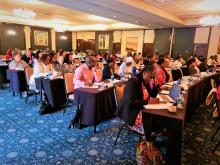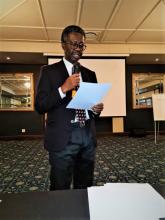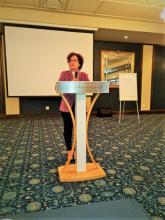Ensuring a policy framework for healthy ageing in Namibia
The Ministry of Health and Social Services with support from WHO held a National Consultation meeting on 15-17 November 2022, on the National Policy on the Rights, Protection and Care of Older Persons in Namibia to review and make recommendation on the draft policy. By 2050, the number and proportion of people aged 60 years and older in the population are estimated to increase from 1 billion (2019) to 2.1 billion globally. In Africa, this increase is estimated to be 220 million compared to 65 million in 2018. This is a dramatic shift in the demographic profile of countries in the African region. WHO estimates that 5.8% of the Namibia’s population is aged 60 and over, with less than one percent aged 80 years and over. Life expectancy at age 60 is 17.2 years, and healthy life expectancy is 12.7 years.
Speaking at the national consultation meeting, Dr Charles Sagoe-Moses, WHO Representative to Namibia, said that this increase is occurring at an unprecedented pace and will accelerate in coming decades. It therefore requires adaptations to the way societies are structured across all sectors within and across countries. He emphasized the impact of the environments on health and behavior, and people’s exposure to health risks, access to services, and opportunities that ageing brings. He further said that ‘This policy is a crucial milestone in addressing the health and rights of older persons.’
Although the Namibia Social Protection Policy makes provision for social protection measures to address poverty amongst older persons through the universal old age grant and free access to public health care, the National Statistics Agency indicates that 44,5% of older persons experience multidimensional poverty. Additionally, the COVID-19 pandemic has highlighted the seriousness of existing gaps in policies, systems and services which may affect government’s ability to ensure that older people fulfil their potential in dignity and equality and in a healthy environment.
Dr Sagoe-Moses commented the government of Namibia on the progress made in some respects of caring for older persons ‘such as the provision of pensions for all older persons, the availability of 17 long-term care facilities registered in the country’. He warned that with the increase in the number and proportion of older person, ‘these facilities will not be sufficient and hence there is need for a more sustainable approach to the care of older persons.’ He advised the country to move from the ‘centralized approach to a more decentralized approach, with more promotive and prevention interventions at the level of the community in line with the Primary Health Care principles.’
The Deputy Executive Director in the Ministry of Health and Social Services, Ms Petronella Masabane said that the policy must boost active healthy ageing, ‘as we benefit very much from the contributions, wisdom and guidance that older persons provide in Namibian society.’ Emphasizing the role of older persons in society she said ‘We must never forget the sacrifices that older persons make in taking care of orphans and vulnerable children. The policy should therefore not only be a token of care towards them, like giving older persons gifts during Christmas time, but it should be firmly based on supportive care, robust protection and sincere realization of their human rights’, she concluded.
The draft policy has 9 strategic action areas:
- Adapting and ensuring access to health systems for older persons
- Facilitating care to older persons and developing long-term care systems
- Investing in older persons’ intergenerational roles
- Addressing and eliminating the abuse of older persons
- Ensuring adequate income security for older persons
- Eliminating age-based discrimination and ensuring access to education and learning in later life
- Ensuring access to adequate housing and the built infrastructure for older persons
- Supporting older persons’ active participation in political and governance processes
- Fostering Africa centered research and training on ageing and later life
Recommendations from the consultation meeting will be incorporated to enrich the draft policy which is envisaged to be finalized and launched in the first quarter of 2023.
Tel: +264 (0) 61 255 121
Email: kaunatjikec [at] who.int
Medical Officer: Child and Adolescent Health
Tel: +264-61-255121/191
Fax: +264-61-204 6202
E-mail: brantuom [at] who.int


